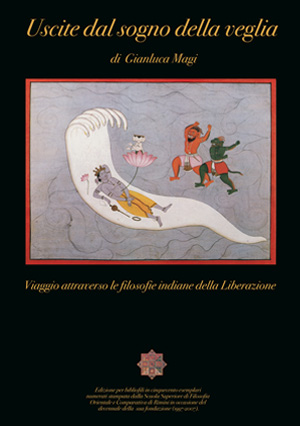
This volume is available only to order,
at the price of 50.00 Euros
For further information or purchase, send an
e-mail clicking on the hand
|
|
Leave the dream of waking
____________________________________________________________
A journey through the Indian philosophies of Liberation
Rimini 2008
Edition for bibliophiles, in five hundred numbered copies, printed by the Superior School of Oriental and Comparative Philosophy in Rimini, in the occasion of its foundation tenth anniversary (1997-2007).
Pages: 78
Tables: 59
Dimension: (cm) 22x30
Binding in bright paperboards, round back with 8 times folded capital and black punched case.
Collation: 8 pnn, 66 pn, 4 pnn
Iconography: Rajasthan Gouache on paper
Colophon: 500 copies marked with Arab numbers and hand-signed
Paper: gr. 130 Old Mill, ivory, Fedrigoni di Verona Paper mill
Printer: Pazzini - Verucchio
Introduction:
A man Shakespeare dreamt of said that we are all made of the same material as dreams; according to Indian philosophies of Liberation, this is not an interjection of bewilderment or a metaphor; it is the direct enunciation of a precise truth. It is so to the extent that Siddhartha Gautama, enlightened, was called «Buddha», «the Awakened». Until this attainment, man lives his life in the dream of waking, pulled here and there by sexual lust (kama), always in the middle of any action, getting by in the fulfilment of the ethic-religious tasks (dharma) society gives him, or bustling about to impose his own interest (artha). These three activities are clearly useful for the continuation of the species, to the extent that Hindu traditional thought devotes an endless literature to each of them. But man who understands their seductive qualities yearns for freeing himself from them, as you do with a dream, or as you take your mind off distracting circumstances. Once he managed the urgencies of life three purposes, in a condition of olympic imperturbability, as pure mirror of the world, he says that life is nothing but an appearance, a game, a farce, a spell, a dream of the still god, who lives undivided in each man. From Veda to nowadays, the Indian metaphysics, the doctrine according to which the universe, including time and space and even us, is nothing but an appearance or a tumult of appearances, has been professed and analysed, in different ways, by many thinkers; even with their differences, they have never been moved by a simple intellectual curiosity, but by an aim almost ignored by the European philosophy: to extinguish the dream of the awake, aiming at Liberation (moksa). As matryoshkas that contain different interior dimensions, Indian doctrines allow, at intervals, the exit from time morass, allowing smiling to the world mirages, as in a morning dream, through which it already translates reality; before the awakening from ignorance, or from sleep, or from life.
|